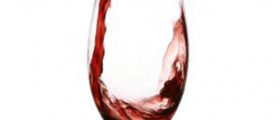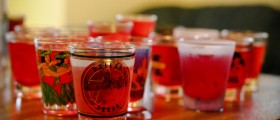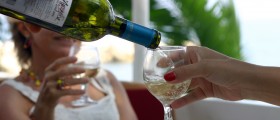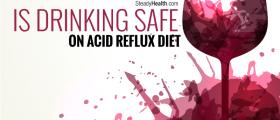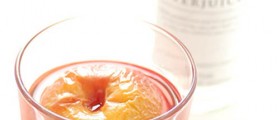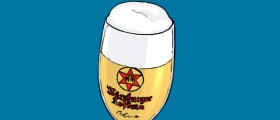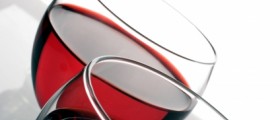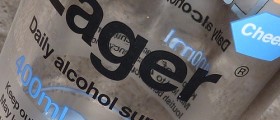I saw this post on another part of these forums:
https://www.steadyhealth.com/drinking_alcohol_causes_pain_in_my_ear__why___t102092.html
What work for me was a half a glass of orange juice right after the wine and the pain went away very quickly.
https://www.steadyhealth.com/drinking_alcohol_causes_pain_in_my_ear__why___t102092.html
What work for me was a half a glass of orange juice right after the wine and the pain went away very quickly.
Loading...
Wow, I found this thread in a google search while suffering from this pain. Like others, I had just drank some alcohol while consuming a meal. It was just curiosity that led me to google it, I didn't know it was so rare! I also get the pain after eating pickles, so the salivary glands being the problem makes sense to me. Anyway, it is just so weird to find out that it's not a common problem among everyone.
Loading...
I have had this problem for so long. Everyone always says it is in my head. The pain happens after I have anything with mustard, vinager, ketchup, alcohol & some other things.
I have found that chewing gum after the pain starts, helps ease it. It hurts like H**L when you first start chewing, but the pain goes away faster, than if I did nothing.
Hope this helps someone.
Phyllis
I have found that chewing gum after the pain starts, helps ease it. It hurts like H**L when you first start chewing, but the pain goes away faster, than if I did nothing.
Hope this helps someone.
Phyllis
Loading...
I had to post and say how relieved I was to find this thread out there. I've been having this pain for ten years off and on when I drink alcohol after eating. It's such an incredible feeling to know that other people experience this same strange and painful sensation as I do.
Anyone found anything else that quickly relieves the pain? Ten minutes of doing nothing usually works for me.
Thanks to you all.
Anyone found anything else that quickly relieves the pain? Ten minutes of doing nothing usually works for me.
Thanks to you all.
Loading...
I get this too. In my case, it is caused by inflamation of the jaw joint. Alcohol somehow makes it worse. Problems with the Temporo Mandibular Joint (TMJ) are common. Sometimes resulting from a blow to the head, or, more commonly, from clenching and grinding teeth at night. Over time, the grinding puts so much pressure on the TMJ that it gets worn. The pain is from inflamation and from muscle spasm. Not much you can do, other than take painkillers or put a warm compress against the TMJ (It is located just next to the ear) and hope the inflamation goes down. Another solution is to use a dental guard. One from nobrux creates a gap between the teeth to protect the teeth, but it also unloads the TMJ so taking the pressure off it.
Hope this helps
Hope this helps
Loading...
Im glad to read that others are having the same problem!
Whenever I have alcohol just before eating I get what feels like a cramp on both sides of my jaw where it attaches. It will eventually fade after 30 minutes or so, but it is very uncomfortable to do much until then. It is interesting that it doesnt occur if I wait until after eating to drink. The next time it happens I will try the vitamin C trick.
Given that this never occurs without the presence of alcohol I doubt highly it is a structural or behavioral issue. I can believe that it is an issue with the alcohol itself.
Just to throw something else into the mix: I also have restless leg syndrome. Other than these two rather odd maladies, I am perfectly healthy.
Whenever I have alcohol just before eating I get what feels like a cramp on both sides of my jaw where it attaches. It will eventually fade after 30 minutes or so, but it is very uncomfortable to do much until then. It is interesting that it doesnt occur if I wait until after eating to drink. The next time it happens I will try the vitamin C trick.
Given that this never occurs without the presence of alcohol I doubt highly it is a structural or behavioral issue. I can believe that it is an issue with the alcohol itself.
Just to throw something else into the mix: I also have restless leg syndrome. Other than these two rather odd maladies, I am perfectly healthy.
Loading...
Hi all,
Its funny because I liken the feeling to the pain I'd get in my jaw when I was a kid and had blown up too many balloons! *ouch!*
Dont panic - its not a disease!! Its a reaction to the acid in the food/drink you are consuming. Its normal, but some people are more reactive to it than others.
I find I mostly get this pain when I drink red wine (sound famiiliar?). Its something to do with your saliva glands and how they react to acidic foods. In wine, the acid is caused by the "Tannins" in the wine. Tannins are in fact Tannic acid. In foods like pickles or lemons, well its acetic acid or citric acid. Pickles and lemons also are also acidic. Some candies have ascorbic acid.
When you drink/eat acids, your mouth goes into saliva overdrive. Saliva is produced under the tongue and along the jaw... right where the pain occurs! The interesting thing about alcohol, is that it also RESTRICTS saliva flow. These contradictory side-effects may worsen the reaction - alcohol dries up your saliva, but at the same time, the tannins in the alcohol causes your saliva glands to work overtime. Voila! You get a pain! If you have a problem with this pain, drink lots of water in advance consuming wine to ensure that your mouth can resist the drying effect of the alcohol. And make sure you keep yourself hydrated while you are drinking! It should help!
Also, try to pick a wine with low tannins. I've included a bit about Tannins in wine below. Basically, red wines tend to have more tannins than white, and the older/better the wine, the less you should feel this effect, as over time tannins settle in the bottom of the bottle, so you dont consume them! You can also pick styles of wine which have less Tannin. Ask your waiter/wine shop assistant to recommend a red wine with low Tannin. They should know!
"Tannins are the flavonoids in wine that give its degree of mouth-drying bitterness one tastes. Tannin is a chemical substance that comes from grape skins, stems, and seeds. The skins also impart color to wine, which is why red wines typically have a lot more tannin than whites. Red wines are fermented while in contact with the skins and seeds. Wines can also take on tannins from the oak or other woods used in wine barrels for storage. Different woods in different countries affect the type of tannins in the wine. Tannins help prevent oxidation, an important role in a wine's aging potential. As age-worthy red wines mature, tannin molecules gradually accumulate and precipitate out of the wine into the harmless sediment (that black sludge at the bottom of older red wines.) Certain wine styles have much less tannin content than others, due to reduced maceration time (grape juice contact with the grape pulp, including sources of tannin such as stems, seeds). French reds from Bordeaux, and Italian reds like Barolo and Barbaresco, are particularly tannic. Vintage port is also very tannic when young, as are wines made from the syrah (shiraz) and cabernet sauvignon grapes. French reds from Burgundy, and Italian wines like Dolcetto and Barbera, are less tannic. Wines made from Pinot Noir and Sangiovese grapes, as well as Spanish Riojas are less tannic. Beaujolais and Tempranillo are also lower tannin wines."
Its funny because I liken the feeling to the pain I'd get in my jaw when I was a kid and had blown up too many balloons! *ouch!*
Dont panic - its not a disease!! Its a reaction to the acid in the food/drink you are consuming. Its normal, but some people are more reactive to it than others.
I find I mostly get this pain when I drink red wine (sound famiiliar?). Its something to do with your saliva glands and how they react to acidic foods. In wine, the acid is caused by the "Tannins" in the wine. Tannins are in fact Tannic acid. In foods like pickles or lemons, well its acetic acid or citric acid. Pickles and lemons also are also acidic. Some candies have ascorbic acid.
When you drink/eat acids, your mouth goes into saliva overdrive. Saliva is produced under the tongue and along the jaw... right where the pain occurs! The interesting thing about alcohol, is that it also RESTRICTS saliva flow. These contradictory side-effects may worsen the reaction - alcohol dries up your saliva, but at the same time, the tannins in the alcohol causes your saliva glands to work overtime. Voila! You get a pain! If you have a problem with this pain, drink lots of water in advance consuming wine to ensure that your mouth can resist the drying effect of the alcohol. And make sure you keep yourself hydrated while you are drinking! It should help!
Also, try to pick a wine with low tannins. I've included a bit about Tannins in wine below. Basically, red wines tend to have more tannins than white, and the older/better the wine, the less you should feel this effect, as over time tannins settle in the bottom of the bottle, so you dont consume them! You can also pick styles of wine which have less Tannin. Ask your waiter/wine shop assistant to recommend a red wine with low Tannin. They should know!
"Tannins are the flavonoids in wine that give its degree of mouth-drying bitterness one tastes. Tannin is a chemical substance that comes from grape skins, stems, and seeds. The skins also impart color to wine, which is why red wines typically have a lot more tannin than whites. Red wines are fermented while in contact with the skins and seeds. Wines can also take on tannins from the oak or other woods used in wine barrels for storage. Different woods in different countries affect the type of tannins in the wine. Tannins help prevent oxidation, an important role in a wine's aging potential. As age-worthy red wines mature, tannin molecules gradually accumulate and precipitate out of the wine into the harmless sediment (that black sludge at the bottom of older red wines.) Certain wine styles have much less tannin content than others, due to reduced maceration time (grape juice contact with the grape pulp, including sources of tannin such as stems, seeds). French reds from Bordeaux, and Italian reds like Barolo and Barbaresco, are particularly tannic. Vintage port is also very tannic when young, as are wines made from the syrah (shiraz) and cabernet sauvignon grapes. French reds from Burgundy, and Italian wines like Dolcetto and Barbera, are less tannic. Wines made from Pinot Noir and Sangiovese grapes, as well as Spanish Riojas are less tannic. Beaujolais and Tempranillo are also lower tannin wines."
Loading...
This topic is being closed due to having too many posts.
Please continue posting within the following one: Shooting pains in jaw when eating and drinking alcohol - part 2
Please continue posting within the following one: Shooting pains in jaw when eating and drinking alcohol - part 2
Loading...



